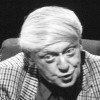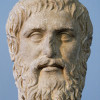“ Viewed objectively, the idea of good is a power or cause which makes the world without us correspond with the world within. ”
Plato, The Republic. copy citation
| Author | Plato |
|---|---|
| Source | The Republic |
| Topic | power ideas |
| Date | |
| Language | English |
| Reference | |
| Note | Translated by Benjamin Jowett |
| Weblink | http://www.gutenberg.org/files/1497/1497-h/1497-h.htm |
Context
“This ideal science is the highest process of thought, and may be described as the soul conversing with herself or holding communion with eternal truth and beauty, and in another form is the everlasting question and answer—the ceaseless interrogative of Socrates. The dialogues of Plato are themselves examples of the nature and method of dialectic. Viewed objectively, the idea of good is a power or cause which makes the world without us correspond with the world within. Yet this world without us is still a world of ideas. With Plato the investigation of nature is another department of knowledge, and in this he seeks to attain only probable conclusions (Timaeus) .
If we ask whether this science of dialectic which Plato only half explains to us is more akin to logic or to metaphysics, the answer is that in his mind the two sciences are not as yet distinguished, any more than the subjective and objective aspects of the world and of man, which German philosophy has revealed to us.”
source


